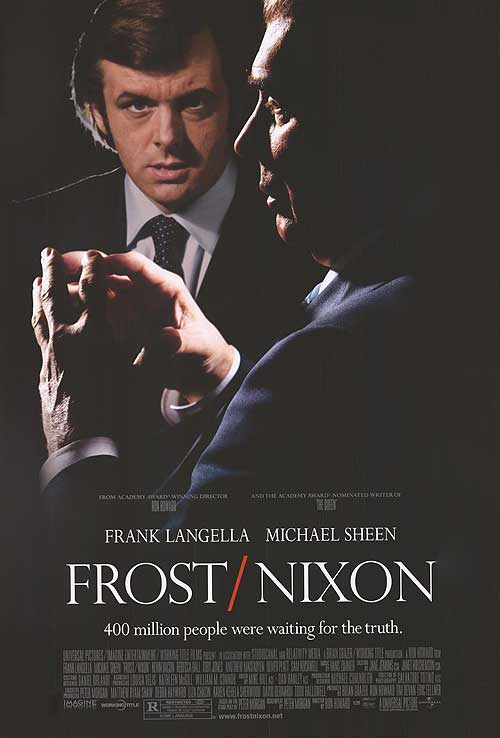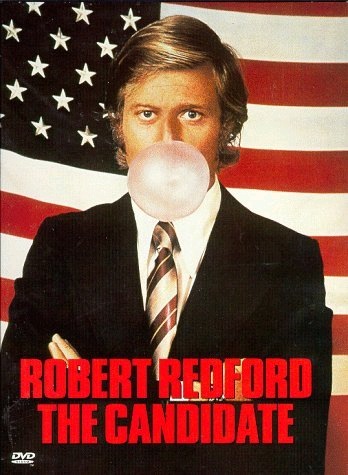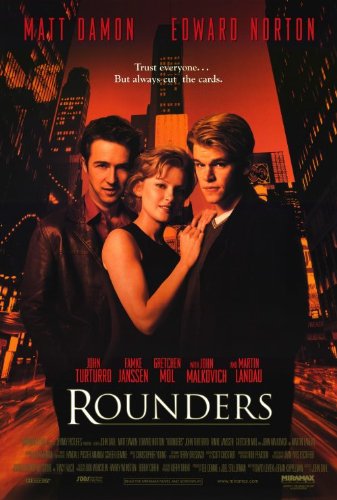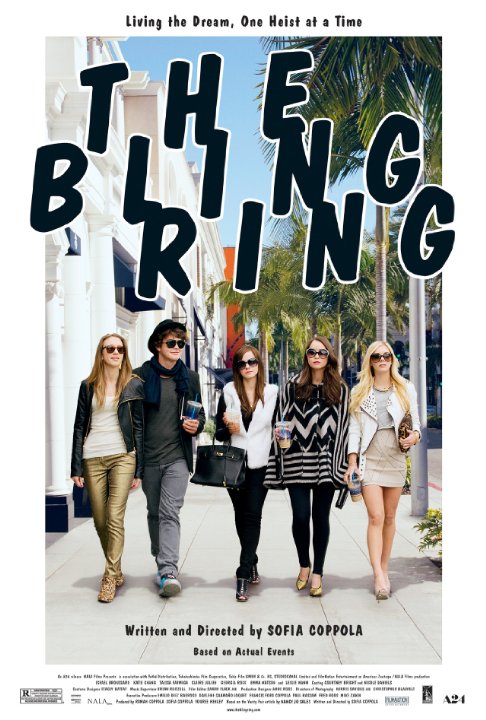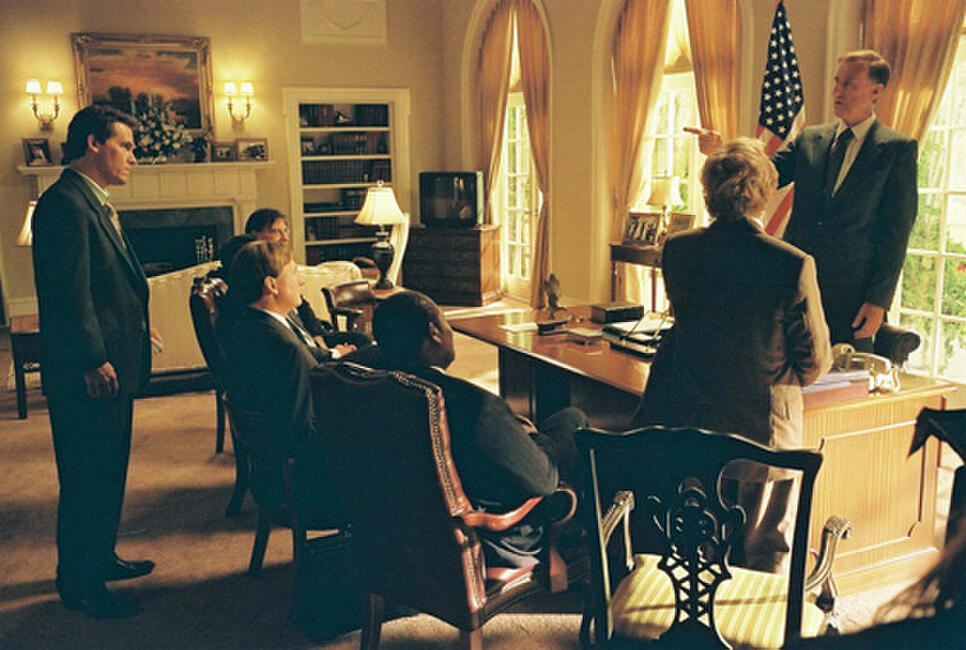
It’s Bush satire vs. Bush fatigue
in this tardy caricature of ‘W.’
Timing’s everything. That is the sentiment that eventually hits home, near the very predictable end of Oliver Stone’s “W.”
Here we have a person who has been the figurehead of America for nearly eight years. But now, his time has passed. So it hits us near the end of this film: There went two more hours spent observing this person.
This film was seen at its opening-day matinee. It was a decent crowd, but not overflowing, and the buzz was noticeably less than for “Fahrenheit 9/11” (the crowd was much quieter) and figures to fade. Imagine such a movie about Sarah Palin or Barack Obama, and there you have a blockbuster. That’ll put butts in the seats, you betcha.
Few directors take the pulse of public sentiment like Oliver Stone. He knows that George W. Bush has sported an approval rating in the 20s or 30s for a remarkably long time. He sees a movie in that, and he is probably right.
Michael Moore saw a different Bush story in his 2004 “Fahrenheit 9/11,” which viewed conspiracy theories seriously. Both movies are intentionally polarizing, but Stone’s is not concerned about facts. It is about sentiment. He is showing us how the country — as a whole — feels about this person, while avoiding too many conclusions about whether the public is correct.
Nevertheless, to sell this, Stone feels compelled to express a point of view, addressed below, as he did with the similar “JFK.” Jim Garrison was more or less discredited, yet Stone in interviews and public appearances for that film promoted conspiracy theories and defended Garrison’s investigations. His more recent “World Trade Center” took heat for allegedly trying to justify the Iraq war, but that film also highly reflected public sentiment, not of the time of release (2006) but of the days following 9/11.
Stone does not appear to be a fan of George W. Bush. They do have things in common. Both were born in 1946, in the Northeast. Both were children of privilege. Both attended Yale and were not particularly successful students; Stone dropped out twice. The divergence is in family — Stone was an only child &mdash and Vietnam, where Stone fought and Bush didn’t.
While it certainly is true that 2/3 (or even 3/4) of the country has not approved of this presidency for some time, not everyone finds the guy detestible. This film is meant for those who do. But it is not the brooding, scathing critique of Stone’s “Nixon” or the recent “The Reagans” that aired on Showtime. It is a two-hour-long episode of “Saturday Night Live,” albeit with an underlying tone of seriousness, for those who want to see unlimited lampooning of Bush and his polarizing advisers.
Josh Brolin certainly must be a handsome person, but as the president, he merely looks “funny,” the way the people in “Fargo” described the Steve Buscemi character. He sports an extremely rough haircut, excessive frowns, and — though this has never been voiced as a complaint against Bush as far as anyone knows — very menacing, dark eyes similar to another of Stone’s favorite subjects, Nixon. The ensemble casting looks intentionally ridiculous, in particular the shaggy, long-haired Don Rumsfeld (Scott Glenn) and the tiny, wimpy Karl Rove (Toby Jones).
This is all for a partisan crowd eager to hoot at the slightest Bush satire. They’re paying $9 or whatever the going megaplex rate is to see this caricature say things like “children is all going to learn,” or get drunk, or eat hamburgers like a glutton with his mouth open, or lead his Cabinet in a walking tour of his Crawford ranch off the path so they get lost, and this audience also doesn’t mind seeing Dick Cheney and Colin Powell trading under-the-breath insults with each other. The most howling was heard after the Iraq invasion was decided and Condoleezza Rice is rattling off the contributions of coalition countries such as Mongolia’s 90 troops and Powell bellowing something about how they’ll probably add great “wrestling moves.”
This crowd is no longer interested in Saudi conspiracy theories or potential Vietnam draft-dodging; that’s yesterday’s news and to be adequately absorbed requires an intensity that has faded for most people.
One notable omission is the presence of the president’s twin daughters, who have made decent fodder for the edgier critics. Stone evidently didn’t want to portray Bush as a father, though that would be relevant as a comparison to the strong points made about W.’s own father. Laura Bush, who actually does have high approval ratings, is played likably by Elizabeth Banks.
With heavy satire, Stone cleverly avoids the most common problem of biopics, that the story, if any, gets lost amid the mimickry. The viewer tends to waste too much time analyzing whether the actors really do resemble the person. That is a brief issue here, during an early Cabinet meeting when about eight faces are present, but the conclusions can quickly be drawn and the viewer can move on to what the characters are actually saying. One problem though is with Tony Blair, who only appears briefly and does not at all resemble the actual former prime minister (as his character played by Michael Sheen does in “The Queen”), but a more youthful, indecisive version. By the time you realize it’s him, you’ve forgotten what he just said.
In another curious bit of cross-pollenization, James Cromwell, who was supposed to look like Prince Philip in “The Queen” and does, plays George H.W. Bush better than the real man himself did. Cromwell is silky smooth, reserved, principled, and maybe most noticeably, has the type of voice that the elder George Bush must’ve longed for.
Stone, in an interview with the Detroit Free Press and probably many others, calls the film “a fair and balanced portrait,” that terminology no doubt his own personal satire of the network most inclined to champion Bush’s presidency. This statement is true in the context of public perception of Bush. Stone doesn’t care about the complete record and knows his viewers certainly won’t; that’s for PBS at a later time. That record includes two impressive gubernatorial victories in Texas; passage of several significant pieces of legislation as president including No Child Left Behind, Medicare expansion, two rounds of tax cuts; increasing his party's hold on both houses of Congress in his first four years; successful appointments of two Supreme Court justices firmly backed by his own party; a two-term presidency, and, a little-known vote that only baseball purists know or care about, the lone opponent in a 27-1 decision in 1993 to create a wild card format.
The record also includes a widely perceived poor response to Hurricane Katrina; dubious, or poorly explained, policies on eavesdropping, detainees and torture; a mini-scandal of fired U.S. attorneys; an embarrassing selection of Harriet Myers for the Supreme Court, and lukewarm proposals on Social Security that quickly crashed and burned. Stone barely mentions those either.
Where Stone does inject his version of fairness is in his interpretation of Bush’s blunders. Stone tends to blame George H.W. Bush for his son’s recklessness. W., according to this screenplay by Stanley Weiser (who also penned Stone’s “Wall Street”), was a wayward man in need of discipline and direction. His father didn’t provide it for him but instead was an enabler. Stone portrays the senior Bush as condescending toward “Junior,” having a low opinion and low expectations, and almost viewing him as helpless, always bailing him out of trouble and not allowing him to become a man. The son is regularly depicted in an empty baseball stadium, daytime and nighttime, apparently dreaming he is Willie Mays, and apparently continuing to dream this because no one has ever told him to stop. It is another son, Jeb, who is the favorite, whom the father really believes in, and W. despises this, determined to show “Poppy” and the world that he’s as good as Jeb.
There is sympathy for people with this kind of background, provided it is true. The elder Bush has made statements that seem to lament the fact Jeb might never be president. Stone, though, is making a major leap in attributing a guy’s dismissal of contrarian war advice to the fact his father might’ve thought his brother was a better politician or better person. This is a curious reach for Stone, who, as an only child, wouldn’t have experience with this issue. Jeb Bush calls this depiction “high-grade, unadulterated hooey.”
A more reasonable explanation of what went down in those Cabinet meetings might’ve been something like this: that Afghanistan was the bigger blunder, a country with few if any legitimate anti-terror targets, a country that had already proven to be a cesspool for foreign intervention, a country that probably no one in the Cabinet or military really had any interest in occupying. But there was intense public pressure after 9/11 to respond, and this was the globally approved location, so this particular country incredibly has become the focus of an extraordinary amount of not only U.S. but global resources and attention that should’ve been redeployed elsewhere many, many years ago, yet still somehow is perceived as the “real” front in the terror war by candidates of both American parties. The president in 2001 had no interest in this, so he hoped the terrorists were from Iraq. They weren’t, and he trusted people who said, with all these troops in Afghanistan, that now is going to be the best chance to hit Iraq, Tony Blair agreed, and it was probably decided that if the U.S. and Great Britain moved forward then the U.N. would follow, it didn’t, backpedaling was then determined to be worse than going alone, and the result was a conflict that has emerged as a logistical and P.R. nightmare and the primary reason for years-long approval ratings in the 30s. There is no question, this is on the president, as one thing Bush and Stone will agree on is that the president has made it clear where the buck stops.
Stone isn’t completely partisan; he shows leading Democratic senators in presidential politics of 2004 and 2008 such as John Kerry, Hillary Clinton and Joseph Biden applauding as the president declares Saddam must be held accountable to U.N. resolutions, well before said candidates would spend years clumsily both reiterating and apologizing for their authorization votes in a defense equally or less impressive than the president’s own “stay the course.”
Politics aside, Stone manages to have fun with a few military cliches. One very likable movie scene occurs again and again in presidential or military films, particularly serious ones, such as “Thirteen Days,” about John Kennedy’s decisions in the Cuban Missile Crisis. It is the scene of the Cabinet gathering where military action is discussed, and when the president asks how quickly the shooting can start, the chairman of the joint chiefs is almost always delighted to say something like, “Mr. President, we can have three bomber crews there in less than an hour.“ It is a general taking pride in his exceptional forces and being able to please his boss, but it’s also an acknowledgment of civilian control over the military, a beautiful Western concept we should all be grateful for even when civilians make mistakes. In “W.,” Donald Rumsfeld enjoys such a brief scene, albeit regarding the quagmire that is now Afghanistan.
Stone spends much more time though on a “Dr. Strangelove” parallel, of Powell fighting with Cheney and others in what amounts to a War Room, during a long scene in which the Iraq campaign is agreed upon. There is a very serious result stemming from this, however, and Stone isn’t able to easily glide between dark humor and solemnity for wounded soldiers.
It’s almost wrong to give this film a rating because it can’t possibly be seen as universal. Clearly it is better than the dreadful “Primary Colors.” The movie does entertain, doesn’t drag until perhaps the last half hour. Stone’s target audience will find something to like here on probably a 3.5-star level. Most Bush supporters and staunch Republicans will consider it unwatchable.
Something in the middle is appropriate. In another time, this might’ve been a zinger. It is now too late for this film. If only Stone had discovered Sarah Palin before John McCain did, he might have a hit on his hands.
2.5 stars
(October 2008)
“W.” (2008)
Starring Josh Brolin as George W. Bush ♦ James Cromwell as George H.W. Bush ♦ Richard Dreyfuss as Dick Cheney ♦ Jeffrey Wright as General Colin Powell ♦ Sayed Badreya as Saddam Hussein ♦ Elizabeth Banks as Laura Bush ♦ David Born as Moderator ♦ Dennis Boutsikaris as Paul Wolfowitz ♦ Jesse Bradford as Thatcher ♦ Jonathan Breck as Corndog ♦ Bruce Bryant as Odessa Debate Patron ♦ Ellen Burstyn as Barbara Bush ♦ Wes Chatham as Jimmy Benedict ♦ Maria Chen as Military Aide ♦ Teresa Cheung as Asian Journalist ♦ Gillian Chung as Exotic Dancer ♦ Rob Corddry as Ari Fleischer ♦ Jon Michael Davis as Campaign Aide ♦ Charles Fathy as Jacques Chirac ♦ Chris Freihofer as Evangelical 2 ♦ Terry Gamble as Rove Aide ♦ Jim Garrity as News Commentator ♦ Michael Gaston as General Tommy Franks ♦ Jeff Gibbs as Josiah Pringle ♦ Scott Glenn as Donald Rumsfeld ♦ Ioan Gruffudd as Tony Blair ♦ Jeff Hoferer as McCormick ♦ Toby Jones as Karl Rove ♦ Stacy Keach as Earle Hudd ♦ James Martin Kelly as NSC Official ♦ Tom Kemp as David Kay ♦ Allan Kolman as Vladimir Putin ♦ Elena Kong as Asian Journalist ♦ William Lanier as Resort Waiter ♦ Brinkley A. Maginnis as Anita Bush ♦ Madison Mason as Admiral Kelly ♦ Bryan Massey as Skeeter ♦ Lee Ann McDade as News Woman ♦ Bruce McGill as George Tenet ♦ John Neisler as White House Lawyer ♦ Randall Newsome as Paul Bremer ♦ Thandie Newton as Condoleezza Rice ♦ Gabriela Ostos-Tamez as Reporter #2 ♦ Paul Rae as Kent Hance ♦ Randal Reeder as Oilrig forman ♦ Jason Ritter as Jeb Bush ♦ Andrew Sensenig as Reporter #1 ♦ Marley Shelton as Fran ♦ Jennifer Sipes as Susie Evans ♦ Bill Stinchcomb as Secret Service ♦ Ronan Summers as CIA #3 ♦ Paul T. Taylor as Well Wisher #2 ♦ Taylor Treadwell as Anchor 2 ♦ Jonathon Tripp as News Boom Operator ♦ Thomas Wallace as John Negroponte ♦ W. Douglas Waterfield as Richard Armitage ♦ Drew Waters as Navy Seal ♦ Brent Weisner as Secret Service Agent ♦ Noah Wyle as Don Evans ♦ Lacey Ford as Car Passenger ♦ Juan Gabriel Pareja as Migrant Worker ♦ Ashley-Anne Parker as Pedestrian ♦ Halley Rachal as Tourist ♦ Matthew Ramsaur as Pedestrian ♦ Steven E. Williams as Motorist / Background Driver ♦ Rodney Wiseman as Oil Man at Party
Directed by: Oliver Stone
Written by: Stanley Weiser
Executive producer: Teresa Cheung
Executive producer: Elliot Ferwerda
Executive producer: Peter D. Graves
Executive producer: Johnny Hon
Executive producer: Christopher Mapp
Executive producer: Tom Ortenberg
Executive producer: Thomas Sterchi
Executive producer: Matthew Street
Executive producer: David Whealy
Executive producer: Albert Yeung
Co-executive producer: Jon Kilik
Producer: Bill Block
Producer: Moritz Borman
Producer: Paul Hanson
Producer: Eric Kopeloff
Co-producer: Suzie Gilbert
Co-producer: Ethan Smith
Original music: Paul Cantelon
Cinematography: Phedon Papamichael
Editing: Julie Monroe
Casting: Sarah Finn
Production design: Derek R. Hill
Art direction: Alex Hajdu ♦ John Richardson
Set decoration: Mel Cooper
Costume design: Michael Dennison
Makeup: Trefor Proud ♦ Matthew W. Mungle ♦ John R. Bayless ♦ Kimberly Amacker ♦ Theresa McCoy McDowell ♦ Stephen Bettles ♦ Krystal Kershaw ♦ Karyn Huston ♦ Tony Ward ♦ Shunika Terry ♦ Jack Lazzaro ♦ Chrissy Morris ♦ Duane Saylor ♦ Louisa Gore Hamn
Stunts: Mark Norby ♦ Durk Tyndall ♦ Bryan Becker

